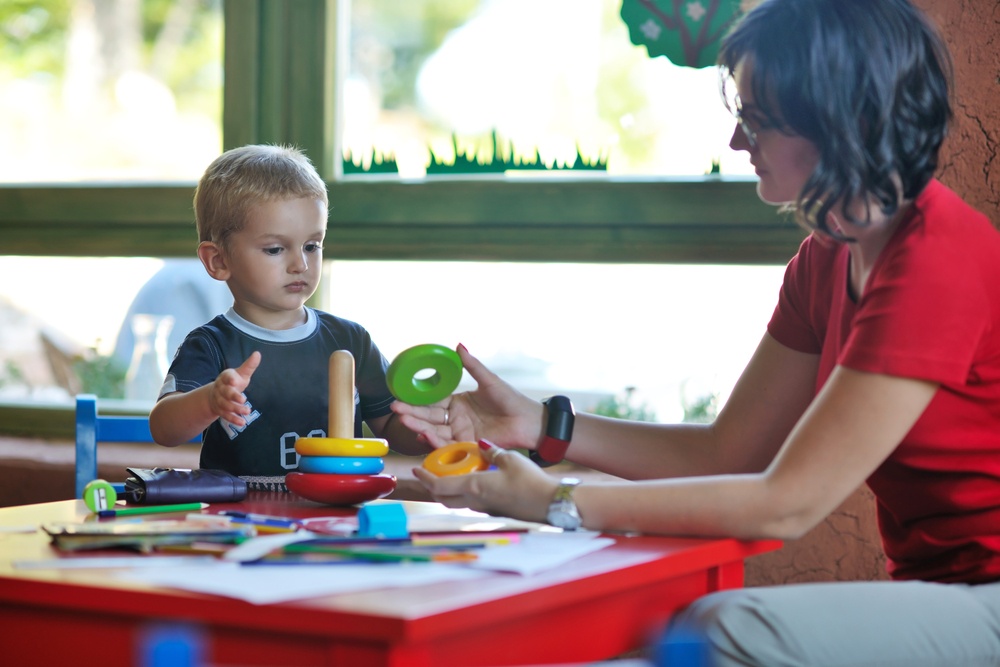Updated December 2025
Collaboration doesn't always come naturally to children (or adults, for that matter!) But that's what the preschool or daycare classroom is really all about: teaching kids how to learn those communication and teamwork skills that each of us needs to thrive, both in school and in life.
It's in the preschool years that children start learning how to form friendships, follow rules, and resolve conflicts with others. Many of these skills grow from working in pairs and larger groups, where listening, sharing, and respecting one another are key to accomplishing tasks and having fun.
In this post, we offer some practical tips early childhood education students can use after college with their first groups of young children. These are simple ways to teach children the value of teamwork and help them build lifelong skills for working together.
1. Lay the foundation with manners lessons
Young children who know simple etiquette will have a much easier time working and sharing with classmates. Imagine pairing two kids together to play with blocks—but they just grab toys from one another instead of waiting their turn and asking politely. Mayhem will quickly ensue!
Children won't play well together if they don't understand the basics of sharing, patience, and politeness. Early childhood educators can introduce these concepts in simple ways, model them consistently, and guide little ones to use manners when playing together. Examples include:
- Teaching kids how to ask a classmate if they'd like to work or play together ("May I work with you?")
- Waiting turns to play with toys (instead of just taking them)
- Saying please and thank you
To teach manners effectively, ECEs should demonstrate each rule and give children plenty of opportunity to practise it. It will take time for your little ones to perfect these routines, and you'll need to give quite a few reminders along the way, but it's time well spent when laying the foundation for great teamwork.
2. Incorporate team-building activities into the daily routine
Teamwork activities are a great opportunity for kids to put etiquette lessons into practice, build their communication skills, and learn what it means to depend on one another to achieve a goal. Collaborative games and tasks can incorporate just two children, or larger groups, with different kinds of challenges suited to varying age groups.
Adding partner or group work into your daily classroom routine is an ideal way to build your kids' collaborative skills. Good examples include:
- Parachute games (where it takes the whole class to lift and lower the parachute, or perhaps bounce a ball off the centre)
- Mazes (where kids work in partners to navigate a toy car or marble through a maze in a box that the ECE has created)
- Building challenges (where kids work in pairs to construct a tower or some other structure using blocks, Legos, etc.)
- Partner painting (where two or three kids take turns adding to a painting, so the end result is a masterpiece they've created together)
For more preschool collaborative activities, pictures, and instructions, take a look at this post on teamwork ideas for younger kids.
3. Be prepared for teamwork conflicts
No matter how carefully you explain the rules or remind kids about manners, you're bound to have some teamwork conflicts as kids develop their collaborative skills. And that's OK! Learning how to resolve disputes is absolutely crucial when working with others.
As the early childhood educator, your role is to intervene when kids can't resolve differences on their own and demonstrate better solutions. This will include several different steps and techniques, such as :
- Explaining which behaviours are not acceptable and should be stopped immediately (like grabbing toys, pushing others out of the way, shouting, or refusing to take turns)
- Pointing out how negative behaviors make the partner or other group members feel (teaching about emotions to build empathy)
- Demonstrating better ways to handle the dispute (reminding the child which manners to use in that particular situation)
- Asking the child to "try again" using the correct manners
- Offering plenty of praise and positive reinforcement when the child corrects the bad behaviour
- Issuing a "timeout" if necessary, during which the child observes the team playing together well and rejoins after a brief calming-down period
How you handle teamwork conflicts can have a dramatic impact on the ways your students work together—and whether they're able to build those essential collaborative and communication skills. It's a slow process for some children, and much more intuitive for others.
Over time, early childhood educators learn how to pair up kids strategically, so those with more advanced collaborative skills can help others along. It's normal for children to learn at different rates, so don't worry if it takes some kids a bit longer to catch on. That's all part of the early childhood teaching experience!
Interested in learning more about careers in early childhood education?
Take a look at Herzing's early childhood education program, delivered online. It takes just 14 months to complete and includes several weeks of hands-on experience.
Chat live with an admissions advisor to get your questions answered now. Or click below to learn more about training and careers. We're here to help!







